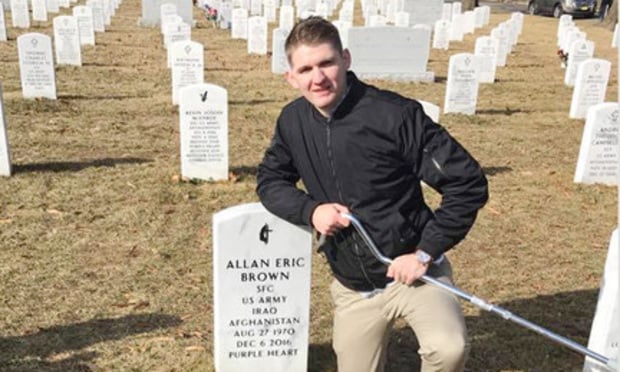Army Vet Who Stopped Suicide Bomber in Afghanistan Sues Military Contractor
“Specialist Hencely saved dozens of lives by stopping the bomber when he did,” said James “Jim” Butler Jr. of Butler Wooten & Peak, lead counsel for Winston Hencely. “The bomber was heading to the race assembly point, where a general and 200 others would be densely packed to start the race.”
February 21, 2019 at 06:11 PM
4 minute read
 Winston Hencely, the plaintiff, at the grave of Army Sgt. 1st Class Allan Eric Brown (Courtesy photo)
Winston Hencely, the plaintiff, at the grave of Army Sgt. 1st Class Allan Eric Brown (Courtesy photo)
Butler Wooten & Peak has filed a lawsuit in South Carolina federal court on behalf of a Georgia soldier who stopped a suicide bomber from getting into a crowd gathered for a road race at Bagram Air Force Base, Afghanistan, in 2016.
Army Spc. Winston Hencely of Effingham County near Savannah was 20 years old when he spotted a man wearing a bulky vest heading toward the assembly point for a Veterans Day 5K run, according to the lawsuit filed Wednesday in the U.S. District Court for the District of South Carolina, Greenville Division.
The named defendant is a military contractor who the suit claims employed the bomber.
“Specialist Hencely saved dozens of lives by stopping the bomber when he did,” said James “Jim” Butler Jr. of Butler Wooten & Peak of Atlanta, Savannah and Columbus, lead counsel for Hencely. “The bomber was heading to the race assembly point, where a general and 200 others would be densely packed to start the race.”
Confronted by Hencely, the bomber exploded the vest, killing six and injuring 17 people. Shrapnel pierced Hencely's skull and chest, causing severe injury and permanent disability, according to the lawsuit.
The defendant is Fluor Corp., a private military contractor headquartered in Irving, Texas, that has 56,000 employees worldwide, according to its website. The lawsuit identified the company's principal place of business as Greenville. The company reported $20 billion in revenue for 2017, and on Wednesday announced a new contract for a chemicals project in Saudi Arabia with Halliburton.
According to the complaint, the suicide bomber worked for Fluor at Bagram Air Force base, and had been a known former member of the Taliban. The suit alleged that the Fluor employee built the suicide bomb vest while on the job, using company materials and tools, and that the company failed to supervise him and escort him off the base at the end of his shift as required.
“The Taliban subsequently boasted it was responsible for the bombing at Bagram Airfield,” the complaint said. “The projectiles that penetrated Hencely's brain and chest were the property of Fluor—pieces of nuts and bolts the bomber obtained from Fluor.”
Asked to respond, a spokesman for Fluor shared a brief statement Thursday.
“We are aware of the complaint filed by Army Specialist Winston Hencely,” Fluor said. “Because of pending litigation, however, we will not be able to provide any additional information at this time.”
Fluor does not yet have counsel entered into the docket.
In addition to Butler, Hencely's legal team includes: Jonathan Tonge and Michael Williford of Butler Wooten & Peak; Andrew Bowen, Paul Painter III, and Constance Cooper of Bowen Painter in Savannah; and Beattie Ashmore of the Beattie Ashmore Law Firm in Greenville.
“Hencely suffers from numbness and inability to fully use his left arm and hand, left leg, and left side of his face and mouth. He suffers from abnormal EEGs and has suffered seizures. He has neuropathic pain, cognitive disorder, chronic post-traumatic stress disorder, and anxiety due to traumatic brain injury,” the complaint said. “Hencely's short-term memory loss will never improve. He likely will never be able to cook for himself because he would forget that he put food on the stove. He likely will never be able to live alone and may require full-time live-in care for the rest of his life.”
The case is Winston Hencely v. Fluor Corp. No number has yet been assigned.
This content has been archived. It is available through our partners, LexisNexis® and Bloomberg Law.
To view this content, please continue to their sites.
Not a Lexis Subscriber?
Subscribe Now
Not a Bloomberg Law Subscriber?
Subscribe Now
NOT FOR REPRINT
© 2025 ALM Global, LLC, All Rights Reserved. Request academic re-use from www.copyright.com. All other uses, submit a request to [email protected]. For more information visit Asset & Logo Licensing.
You Might Like
View All

On The Move: Ex-Partner Returns to Lead Nelson Mullins Corporate Group, Burr & Forman Hires University GC as COO
5 minute read
Law Firm Sued for Telemarketing Calls to Customers on Do Not Call Registry

Evidence Explained: Prevailing Attorney Outlines Successful Defense in Inmate Death Case
Trending Stories
Who Got The Work
J. Brugh Lower of Gibbons has entered an appearance for industrial equipment supplier Devco Corporation in a pending trademark infringement lawsuit. The suit, accusing the defendant of selling knock-off Graco products, was filed Dec. 18 in New Jersey District Court by Rivkin Radler on behalf of Graco Inc. and Graco Minnesota. The case, assigned to U.S. District Judge Zahid N. Quraishi, is 3:24-cv-11294, Graco Inc. et al v. Devco Corporation.
Who Got The Work
Rebecca Maller-Stein and Kent A. Yalowitz of Arnold & Porter Kaye Scholer have entered their appearances for Hanaco Venture Capital and its executives, Lior Prosor and David Frankel, in a pending securities lawsuit. The action, filed on Dec. 24 in New York Southern District Court by Zell, Aron & Co. on behalf of Goldeneye Advisors, accuses the defendants of negligently and fraudulently managing the plaintiff's $1 million investment. The case, assigned to U.S. District Judge Vernon S. Broderick, is 1:24-cv-09918, Goldeneye Advisors, LLC v. Hanaco Venture Capital, Ltd. et al.
Who Got The Work
Attorneys from A&O Shearman has stepped in as defense counsel for Toronto-Dominion Bank and other defendants in a pending securities class action. The suit, filed Dec. 11 in New York Southern District Court by Bleichmar Fonti & Auld, accuses the defendants of concealing the bank's 'pervasive' deficiencies in regards to its compliance with the Bank Secrecy Act and the quality of its anti-money laundering controls. The case, assigned to U.S. District Judge Arun Subramanian, is 1:24-cv-09445, Gonzalez v. The Toronto-Dominion Bank et al.
Who Got The Work
Crown Castle International, a Pennsylvania company providing shared communications infrastructure, has turned to Luke D. Wolf of Gordon Rees Scully Mansukhani to fend off a pending breach-of-contract lawsuit. The court action, filed Nov. 25 in Michigan Eastern District Court by Hooper Hathaway PC on behalf of The Town Residences LLC, accuses Crown Castle of failing to transfer approximately $30,000 in utility payments from T-Mobile in breach of a roof-top lease and assignment agreement. The case, assigned to U.S. District Judge Susan K. Declercq, is 2:24-cv-13131, The Town Residences LLC v. T-Mobile US, Inc. et al.
Who Got The Work
Wilfred P. Coronato and Daniel M. Schwartz of McCarter & English have stepped in as defense counsel to Electrolux Home Products Inc. in a pending product liability lawsuit. The court action, filed Nov. 26 in New York Eastern District Court by Poulos Lopiccolo PC and Nagel Rice LLP on behalf of David Stern, alleges that the defendant's refrigerators’ drawers and shelving repeatedly break and fall apart within months after purchase. The case, assigned to U.S. District Judge Joan M. Azrack, is 2:24-cv-08204, Stern v. Electrolux Home Products, Inc.
Featured Firms
Law Offices of Gary Martin Hays & Associates, P.C.
(470) 294-1674
Law Offices of Mark E. Salomone
(857) 444-6468
Smith & Hassler
(713) 739-1250






